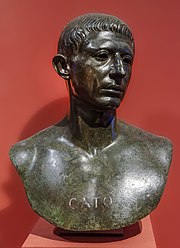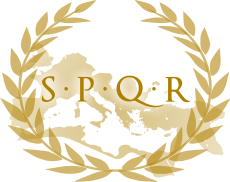 Global Information
Global InformationCato the Younger information
Cato the Younger | |
|---|---|
 Inscribed bronze bust from Volubilis | |
| Born | 95 BC Roman Republic |
| Died | April 46 BC (aged 49) Utica, Africa, Roman Republic |
| Cause of death | Suicide |
| Nationality | Roman |
| Occupation | Politician |
| Known for | Opposition to Julius Caesar |
| Office |
|
| Spouses |
|
| Children |
|
| Parents |
|
| Relatives |
|
| Family | gens Porcia |
| Military career | |
| Allegiance |
|
| Rank | Praetor |
| Wars |
|
 |
| Part of a series on |
| Ancient Rome and the fall of the Republic |
|---|
|
People
Events
Places
|
Marcus Porcius Cato Uticensis ("of Utica"; /ˈkeɪtoʊ/, KAY-toe; 95 BC – April 46 BC), also known as Cato the Younger (Latin: Cato Minor), was an influential conservative Roman senator during the late Republic. His conservative principles were focused on the preservation of what he saw as old Roman values in decline. A noted orator and a follower of Stoicism, his scrupulous honesty and professed respect for tradition gave him a powerful political following which he mobilised against powerful generals of his day, including Julius Caesar and Pompey.
Before Caesar's civil war, Cato served in a number of political offices. During his urban quaestorship in 63 BC, he was praised for his honesty and incorruptibility in running Rome's finances. He passed laws during his plebeian tribunate in 62 BC to expand the grain dole and force generals to give up their armies and commands before standing in elections. He also frustrated Pompey's ambitions by opposing a bill brought by Pompey's allies to transfer the military command to Pompey against the Catilinarian conspirators. He opposed, with varying success, Caesar's legislative programme during Caesar's first consulship in 59 BC. Leaving for Cyprus the next year, he was praised for his honest administration and after his return was elected as praetor for 54 BC.
He supported Pompey's sole consulship in 52 BC as a practical matter and to draw Pompey from his alliance with Caesar. In this, he was successful. He and his political allies advocated a policy of confrontation and brinksmanship with Caesar; though it seemed that Cato never advocated for actual civil war, this policy greatly contributed to the start of civil war in January 49 BC. During the civil war, he joined Pompey and tried to minimise the deaths of his fellow citizens. But after Pompey's defeat and his own cause's defeat by Caesar in Africa, he preferred to take his own life rather than beg or receive Caesar's pardon. His suicide turned him into a martyr for and a symbol of the Republic.
His political influence was rooted in his moralist principles and his embodiment of Roman traditions that appealed to both senators and the innately conservative Roman voter. He was criticised by contemporaries and by modern historians for being too uncompromising in obstructing Caesar and other powerful generals. Those tactics and their success led to the creation of the First Triumvirate and the outbreak of civil war. The epithet "the Younger" distinguishes him from his great-grandfather, Cato the Elder, who was viewed by ancient Romans in similar terms as embodying tradition and propriety.
- ^ Broughton 1952, p. 606, for all offices listed.